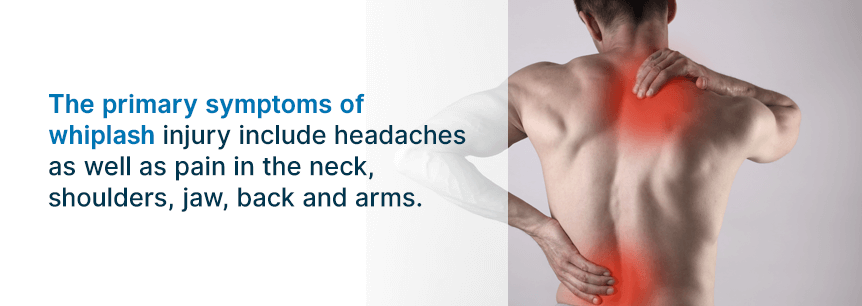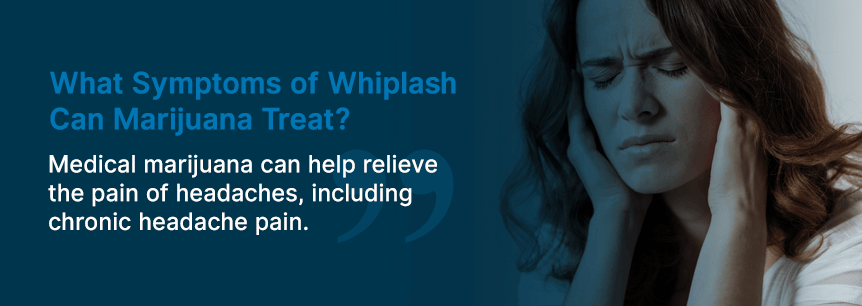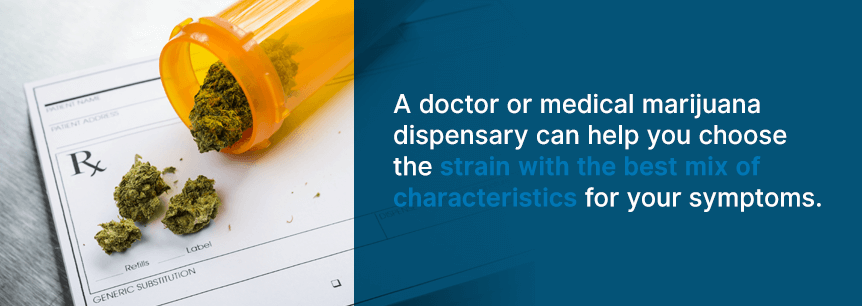
Whiplash can cause substantial pain and uncomfortable sensations. In most instances, whiplash is temporary and heals mainly on its own. In these cases, users might need medicine to reduce symptoms as the condition improves. Sometimes, whiplash may lead to other diagnoses that require other longer-term treatments. In both cases, medical cannabis may be a smart treatment option for whiplash.
Whiplash is a relatively common injury typically caused by impact from behind while in a stationary position. It often occurs in automobile crashes, especially those in which one party is sitting still, such as at a red light, and the other party hits them from behind. This can cause violent, rapid movement of the head and neck forward and backward. The resulting injury is called whiplash.
Medical experts believe that the rear impact, such as from a car, can force the head and neck into a hyperextended backward position before going into a hyperflexed forward position. When this occurs, the lower cervical vertebra experience hyperextension while the upper cervical vertebrae experience a hyperflexed position. This movement forces the cervical spine into an abnormal S-shape, which may damage the soft tissues that hold together the cervical vertebrae.
Today, the term is most often used regarding car accidents. Other sources of impact, however, can also cause whiplash. Before cars were common, whiplash was frequently called “railway spine” when it occurred due to train accidents. Whiplash could also occur due to impact from another person or a heavy object.
Often, whiplash is a temporary condition that heals largely on its own. It’s not life-threatening, but it can cause significant discomfort. In some cases, whiplash can lead to chronic conditions often referred to as whiplash-associated disorders.
The primary symptoms of whiplash injury include headaches as well as pain in the neck, shoulders, jaw, back and arms. It can also cause substantial neck and shoulder stiffness and arm weakness. Other common effects include dizziness, fatigue, tinnitus and visual disturbances. These symptoms can last for days, weeks, months or become chronic.

Whiplash-associated disorders include insomnia, dependency on drugs used to treat whiplash pain, depression, anger, frustration, anxiety and stress. If the impact that caused the whiplash injury occurred during a particularly traumatic event, post-traumatic stress disorder may also coincide with whiplash.
After an accident that may have caused whiplash, a patient will typically visit a hospital or doctor’s office to be checked for injuries. This visit will include a basic physical examination and may also include X-rays or a magnetic resonance imaging study, commonly called an MRI. If the X-rays or MRI come back normal, but the pain continues, the patient may have to return for additional examinations.
If the doctor determines that the patient has sustained injuries due to whiplash, the doctor may take one or more of these treatment options.
Another emerging treatment is medical marijuana. This approach has many potential benefits, but it can be useful to have an understanding of how marijuana works before trying it. Read on to find out about how medical marijuana can help with whiplash.
Evidence that marijuana works to treat headaches dates back to at least the 19th century, though anecdotal evidence has existed for much longer. Dr. John Russell Reynolds wrote of using medical marijuana to treat headaches in 1868. In his treatment of two young women, he found no adverse side effects as it pertained to the headaches that he could link to medical marijuana. Both patients found rapid relief from their headaches under his treatment with what he called “Indian hemp.” He also had this to say about its safety as a treatment, “The bane of many opiates and sedatives is this, that the relief of the moment, the hour, or the day, is purchased at the expense of to-morrow’s [sic] misery. In no one case to which I have administered Indian hemp, have I witnessed any such results.”
In fact, research has shown that medical marijuana can treat some of the most painful chronic headaches one can suffer — migraines and cluster headaches. Among the best arguments for medical marijuana as a treatment for chronic whiplash-related headaches is the low rate of addiction and the lack of potential for fatal overdose. Unlike most other prescription pain relievers, marijuana cannot cause overdose.
There is also anecdotal and medical research that supports medical marijuana as a general pain reliever. A study by the University of California, San Francisco, also shows marijuana can increase the effect of opiates, leading to a lower necessary dose of the dangerous drugs. As of now, more research is needed in all of these uses for medical marijuana.
Medical marijuana can help relieve the pain of headaches, including chronic headache pain. The cannabinoid receptors in your body impact how you feel pain. When you use marijuana, the cannabinoids in marijuana find these receptors and attach to them to help reduce your pain. As mentioned earlier, cannabis may also be able to ease the pain of migraines and cluster headaches or even prevent them from starting.

Other pain produced by whiplash appears to be muscular, inflammatory and sometimes caused by neuropathy. Research with medical marijuana and multiple sclerosis shows that medical marijuana can help pain caused by neuropathy. It can also help relax muscles and reduce the number of muscle spasms a whiplash patient may have. Medical marijuana research on inflammatory illnesses such as Crohn’s disease shows that it can reduce inflammation.
Other studies have shown that medical marijuana can help people fall asleep and stay asleep. Whiplash sufferers who have difficulty sleeping after sustaining their injuries can benefit from this effect. Furthermore, sufferers whose pain is causing the sleep disturbance can benefit from the pain-relieving effects of marijuana and its ability to produce restful sleep.
The depression that sometimes occurs with whiplash can be a reaction to chronic pain and discomfort. There is some evidence that medical marijuana can treat depression even in those who do not have whiplash. However, coupled with the capacity to manage chronic pain that may be causing the depression, medical marijuana can provide multi-symptom relief from whiplash.
Marijuana may also help to relieve some of the other more mental and emotional symptoms associated with whiplash, such as anxiety, stress and frustration. Medical pot, especially strains high in cannabidiol, commonly called CBD, are especially effective in this area. Both scientific and anecdotal evidence suggest that cannabis may also be useful for treating post-traumatic stress disorder, PTSD, that may occur along with whiplash.
The best strains of cannabis for whiplash depend on the symptoms you want to treat. A doctor or medical marijuana dispensary can help you choose the strain with the best mix of characteristics for your symptoms.

There are two main families of marijuana strains — indica and sativa. While both kinds can provide pain relief, indica strains have a stronger effect on the body, while sativa tends to have more of an impact on the mind. Indica typically relaxes the user, while sativa strains can be stimulating. You can also find hybrid strains, which balance the characteristics of indica and sativa.
The differences in the levels of the various cannabinoids, the compounds in weed that interact with the human body, in the two types of plant are what gives them their unique effects. Sativa strains typically have more THC, which produces more psychoactive effects, while indica tends to have more CBD, which is known for its body effects and the relaxation it creates.
Because CBD, and therefore indica, have more of a body effect and because relaxing muscles helps with whiplash pain, indica strains are often best for treating whiplash. However, hybrids sometimes have unique effects that can be beneficial for treating this injury. Sometimes, a sativa strain may even be the right choice for you. Again, a doctor or dispensary can help you choose the right strain for your symptoms.
Some of the best strains available for whiplash injury and associated disorders include:
There are many different ways in which you can use medical marijuana, and these different methods can slightly alter the medicine’s effects. A doctor or dispensary personnel can give you advice on the best method for you. Experimentation is sometimes the best way to find the technique you like best. A few of the marijuana consumption methods you may want to try are:
The effects of marijuana can vary widely depending on the type of weed you use, the amount you use, how you use it and even the mindset you’re in when you take it. Some of these effects may be unwanted.
Potential side effects of medical marijuana include:
Always follow your doctor’s advice when it comes to side effects. They may warn you not to drive or operate machinery after using marijuana. The effects will vary from situation to situation, so always make sure to follow medical advice carefully.
Luckily, medical marijuana is not addictive like opioids are. Taking too much marijuana also won’t have severe health impacts like overdosing on some other medications might.

If you are suffering from whiplash or whiplash-associated disorders, consider medical marijuana as a treatment. If you want to learn more, browse our website here at MarijuanaDoctors.com. We also provide a directory of medical marijuana doctors and a database of dispensaries to make it easy for you to find the resources you need.
Find A Doctor Find A Dispensary